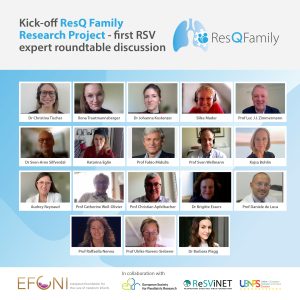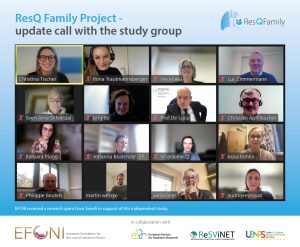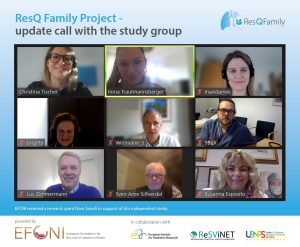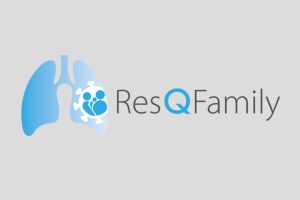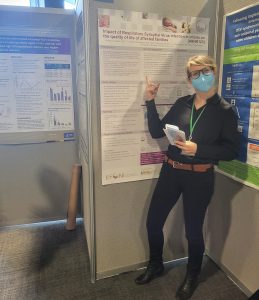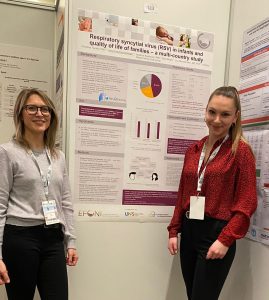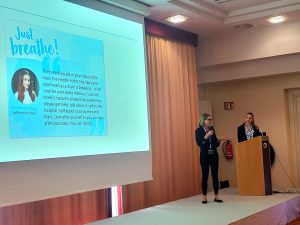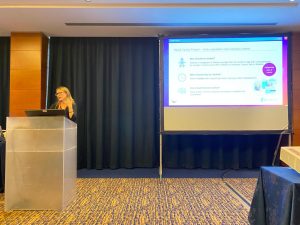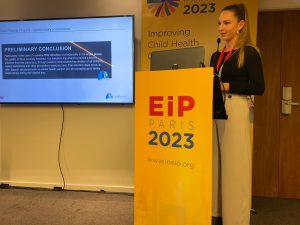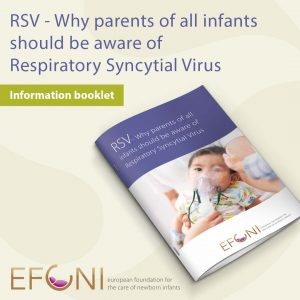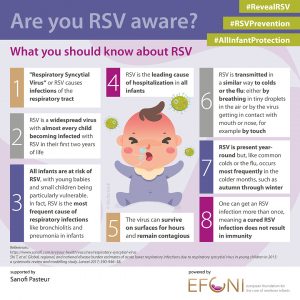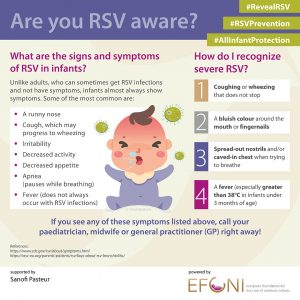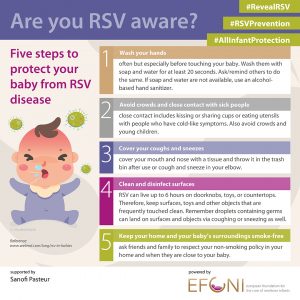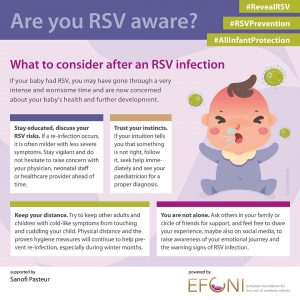ResQ Family: Impact of Respiratory Syncytial Virus (RSV) Hospitalisation on Quality of Life of Families – A Multi-Country Study
NEW PUBLICATION RELEASED: RESQ FAMILY DESCRIPTIVE PAPER
Following the launch of the ResQ Family Study in 2022/23, we are very delighted to present our latest publication: The Multifaceted Burden of Respiratory Syncytial Virus (RSV) Infections in Young Children on the Family: A European Study
This publication provides an overview of the overall and country-specific descriptive findings on the impact of an RSV-induced infant hospitalisation on the entire family and outlines not only RSV-related symptoms but also parenteral health-related quality of life dimensions. Besides, country-specific results focusing on parenteral feelings in relation to the child’s health status, health literacy and disease awareness, and the quality of communication and support structures from healthcare providers are also addressed. For further information please click the button below.

Project Overview
Respiratory Syncytial Virus (RSV) is a very contagious virus. It is the most common cause of paediatric bronchiolitis and pneumonia – which are both a type of lower respiratory tract infection (LRTI). By the age of two years nearly all children will be infected with RSV at least once. Globally, it is a leading cause of hospitalisations among young infants with approximately 33 million cases of acute lower respiratory infections causing more than three million hospitalisations each year in children younger than 5 years. While most RSV cases are mild, we cannot predict which infants could get seriously ill and end up in hospital. This is because the course of the disease is unpredictable. When the RSV infection is severe and associated with hospitalisation, it may lead to intensive care unit admissions with use of supportive care such as mechanical ventilation. It may further result in long-term complications such as recurrent wheezing, reduced pulmonary function and asthma. Moreover, RSV-related hospitalisations can be associated with a significant burden on the entire family, leading to considerable stress and increased loss of work productivity.
Aim of the ResQ Family project
Until today, there is only little information available on how severe RSV infection leading to hospitalisation of the infant impacts the quality of life of affected families. For the ResQ Family project, an online questionnaire was used to survey parents or caregivers of children up to 24 months who have been hospitalised at the time of the survey or shortly before (length of hospital stay of at least 12 hours and hospital admission no longer than 4 weeks before survey date) due to RSV infection.
The aim of the ResQ Family project is to find out how infant RSV hospitalisation impacts the quality of life of affected children and their families. The goal is further to provide scientific evidence on the burden of RSV and raise awareness among all relevant stakeholders including healthcare professionals and patient representatives, decision-makers and the general public. The project will run until June 2024. The data collection took place during the RSV season from autumn 2022 to spring 2023 in four European countries: France, Germany, Italy and Sweden.
The responses of the ResQ Family study participants highlight the drastic impact of the child’s health status on the health-related quality of life, family functioning and work life of parents in all four participating countries, especially during the acute phase of the RSV infection. In addition, our study findings reveal potential stressors and country-specific gaps that need to be addressed in the future to minimise the negative impact on affected children and their families.
For a detailed overview of the key study and the country-specific results, click on the button below!
EFCNI Project Team:
Dr Christina Tischer Head of Scientific Affairs and Research
Ilona Trautmannsberger Project Manager
Prof Luc Zimmermann Senior Medical Director
Silke Mader Chairwoman of the Executive Board
Catherina Witte Head of Communications
Ina Adamek Communications Manager
Laura Staudt Graphic Designer
The team of EFCNI is leading the ResQ Family project. It will be conducted in close collaboration with renowned international experts, scientific advisors and parent representatives. International and local partners in the respective countries support the project. For further information, please contact: research@efcni.org
External Scientific Advisory Board (ESAB) members:
Prof Christian Apfelbacher Institute of Social Medicine and Health Systems Research (ISMHSR), Otto-von-Guericke University Magdeburg, Magdeburg, Germany
Dr Philippe Beutels Faculty of Medicine and Health Sciences, University of Antwerp, Antwerp, Belgium
Dr Brigitte Essers Maastricht University Medical Centre, The Netherlands
Prof Ulrike Ravens-Sieberer Department of Child and Adolescent Psychiatry, Psychotherapy and Psychosomatics, University Medical Centre Hamburg-Eppendorf, Hamburg, Germany
Project Expert Group (PEG) members:
Prof Kajsa Bohlin Department of Neonatology, Karolinska University Hospital/ Karolinska Institutet, Stockholm, Sweden
Prof Louis Bont Department of General Pediatrics and Pediatric Infectious Diseases, Wilhelmina Children’s Hospital, University Medical Center, Utrecht, The Netherlands
Prof Danièle de Luca Division of Pediatrics and Neonatal Critical Care, A. Béclère Medical Center, Paris Saclay University Hospitals, APHP, Paris, France
Katarina Eglin Bundesverband “Das frühgeborene Kind” e.V. (BVDfK), Frankfurt (Main), Germany
Prof Susanna Esposito Paediatric Clinic, Pietro Barilla Children’s Hospital, University of Parma, Parma, Italy
Prof Fabio Midulla Department of Maternal Infantile and Urological Sciences, Sapienza University of Rome, Rome, Italy
Prof Raffaella Nenna Department of Maternal Infantile and Urological Sciences, Sapienza University of Rome, Rome, Italy
Dr Barbara Plagg Institute of General Practice and Public Health, Provincial College for Health Professions Claudiana, Bolzano, Italy
Audrey Reynaud SOS Préma, Boulogne Billancourt, France
Karl Rombo Riksförbundet Svenska Prematurförbundet, Stockholm, Sweden
Dr Sven Arne Silfverdal Department of Clinical Sciences, Umeå University, Umeå, Sweden
Prof Catherine Weil-Olivier Pediatrics, University of Paris, 7 Denis Diderot, Paris, France
Prof Sven Wellmann Clinic for Paediatric and Young Adult Medicine, Klinik St. Hedwig Regensburg, Regensburg, Germany
Dr Martin Wetzke Clinic for Pediatric Pneumology, Allergology and Neonatology, Hannover Medical School (MHH), Hannover, Germany
ResQ Family Study Protocol
To learn more about the background and methods of the study, we kindly invite you to take a look at the ResQ Family study protocol, which provides the scientific basis of the project. It defines the study design and objectives, describes the involvement of relevant stakeholders such as affected parents but also healthcare professionals and researchers experienced with RSV and explains the recruitment of the study population. For further information, please click on the button below!
On 28 April 2022, EFCNI hosted the first digital RSV expert roundtable of the new research project “ResQ Family”. A team of key experts in RSV and quality of life research, including researchers, neonatologists, paediatricians and parent representatives met online for the first time to discuss the project and study design. The results of this expert exchange will feed into an online questionnaire which will be used to survey caregivers of affected infants up to 2 years of age. Our sincere thanks go to all experts for their valuable contributions.
We ended the year 2022 hosting another digital update call with our ResQ Family study group. The goal of this expert exchange was to further strengthen our recruitment strategy in all four participating countries and expand our network. Our sincere thanks go to all experts for their valuable contributions and we look forward to advancing this important research in 2023!
We started the new year 2024 coming together with our expert group for an update on the ResQ Family project. Together, we discussed planned publication, communication and dissemination activities and defined upcoming milestones and tasks for 2024. As RSV-related hospitalisations will continue to represent a significant challenge for the healthcare system in the future, it is important to keep raising awareness of the relevance of the disease to ultimately improve future care of affected families. Our sincere thanks go to all experts for their valuable contributions and to all affected families who participated in the survey. We are excited to continue working on this important project!
Since the launch of the ResQ Family study in September 2022, the ResQ Family team attended several national and international conferences and congresses to explain the aim of the study, to inform about the progress of the project and to present some first results. Below you can find an overview of the various conferences and congresses in which we have actively participated with our research project.
EFCNI’s Parent Organisation Summit (POS), 2022
At the Parent Organisation Summit (POS) in Freising in May 2022, the project was internally introduced to our corporate partners and international network of patient and parent organisations. In their presentation, Dr Christina Tischer, Head of Scientific Affairs and Research, and project manager Ilona Trautmannsberger, pointed out the global burden of RSV in children and emphasised the necessity to provide scientific evidence on the impact on quality of life of families experiencing hospitalisation of their child due to RSV infection.
12th International RSV Symposium Belfast (RSV2022), 2022
At RSV2022 in Belfast in September 2022, the ResQ Family project was officially presented to the public and the recruitment process for the survey was launched on the EFCNI communication channels. Dr Christina Tischer attended the symposium with a poster presentation to introduce the research project to the experts on-site. Participants had the chance to learn more about the study aim and objectives, study design, methodology as well as project milestones.
7th ReSViNET Conference (RSVVW23), 2023
In February 2023, Dr Christina Tischer and Ilona Trautmannsberger travelled to Lisbon, Portugal, to attend the 7th ReSViNET conference on novel RSV preventive and therapeutic interventions with a poster presentation. Experts on-site were invited to find out more about the methodology of this project and to gain an insight into the first quantitative and qualitative results of the study. Besides, this networking event offered the opportunity to raise awareness for the recruitment of further survey participants.
EFCNI’s Parent Organisation Summit (POS), 2023
At the Parent Organisation Summit (POS) 2023, the current project status and milestones were presented, and Dr Christina Tischer and Ilona Trautmannsberger gave the audience first insights into preliminary study results concerning patient characteristics, parental health related quality of life as well as health literacy and support structures. Besides, the emotional quote of PEG member Dr Barbara Plagg was presented, summarising the worries and concerns of affected families.
Congress of joint European Neonatal Societies (jENS), 2023
As the data analysis process has advanced, Dr Christina Tischer presented further results of the ResQ Family study as well as a preliminary conclusion at the jENS congress in Rome in September 2023. Based on the results analysed, an initial call to action was published, highlighting the need for greater disease awareness and the importance of prevention measures among healthcare professionals, patient representatives and decision-makers.
Excellence in Pediatrics (EiP), 2023
ResQ Family project manager Ilona Trautmannsberger gave a presentation at the Excellence in Pediatrics (EiP) congress in Paris in November 2023 and provided further insights into the impact of RSV related hospitalisations of infants on different dimensions of quality of life of affected families. Findings that were presented were related to RSV symptoms and parental worry about symptoms, parental feelings in relation to the child’s health status during hospitalisation as well as health literacy and general family support.
GESELLSCHAFT FÜR NEONATOLOGIE UND PÄDIATRISCHE INTENSIVMEDIZIN (GNPI), 2024
At the GNPI in Munich in April 2024, ResQ Family Project Manager Ilona Trautmannsberger guided the audience through the official study results, which related to the presence and severity of different RSV-induced symptoms, the parents’ concern about them and the general health of the caregiver before, during and after the RSV infection of the child. In addition, scores for health-related quality of life (HRQoL) and family functioning were highlighted, showing that both were significantly reduced during the acute phase of hospitalisation, indicating increased stress levels in everyday family life. In addition, the lack of mental health support for affected families was addressed and the importance of expanding effective support structures was reiterated in the preliminary conclusion.
EFCNI’S PARENT ORGANISATION SUMMIT (POS), 2024
At the Parent Organisation Summit (POS) 2024, Project Managers Dr Christina Tischer and Ilona Trautmannsberger brought the attending community of international parent and patient organisations up to date on the ResQ Family Study. In their presentation, they addressed the loss of work productivity among caregivers and pointed out additional barriers when visiting the child in hospital, such as distance to the hospital or costs for accommodation and travelling. Furthermore, RSV awareness and support structures as well as parental health-related quality of life (HRQoL) and family functioning scores were illuminated from a country-specific perspective. During the second part of the presentation, the dissemination strategy was introduced and campaign assets were presented, with the audience taking part in a survey on their preferred materials to promote the study results in their own countries.
Further conferences and congresses with ResQ Family contribution will follow this year!
PARENT BOOKLET “RSV – WHY ALL PARENTS OF INFANTS SHOULD BE AWARE OF RESPIRATORY SYNCYTIAL VIRUS!” It is important for parents to be informed about all aspects of their child’s health and well-being, but also about potential risks and effective preventive measures to protect their child. On that account, we have – together with experts in the field of neonatology and paediatrics, RSV and infectious diseases – created this parent booklet which provides specific and understandable information on the important yet sometimes underrecognised topic: “RSV – Why all parents of infants should be aware of Respiratory Syncytial Virus” . The booklet summarises what you as parents should know about RSV to help you take the right measures for your baby’s health: It provides you with easy-to-understand information about RSV and its symptoms, illustrated with helpful infographics. Valuable first-hand advice from parents and doctors shows how to recognise an infection and what you as parents can do yourself to protect your child from RSV. Download your booklet copy here and enjoy reading!
RSV INFOGRAPHICS Here you will find simply illustrated information on facts and questions about RSV:
- What you should know about RSV
- What are the signs and symptoms of RSV in infants?
- Five steps to protect your baby from RSV disease
- What to consider after an RSV infection
Please feel free to download and share these infographics to educate and create awareness of this still underrecognised disease that can affect all infants.
[1] Bianchini S et al. Role of Respiratory Syncytial Virus in Pediatric Pneumonia. Microorganisms. 2020 Dec 21;8(12):2048. doi: http://doi.org/10.3390/microorganisms8122048
[2] Díez-Gandía E et al. The impact of childhood RSV infection on children’s and parents’ quality of life: a prospective multicenter study in Spain. BMC Infect Dis. 2021 Sep 6;21(1):924. doi: http://doi.org/10.1186/s12879-021-06629-z
[3] Lapillonne A et al. Impact on parents of bronchiolitis hospitalization of full-term, preterm and congenital heart disease infants. BMC Pediatr 12, 171 (2012). doi: http://doi.org/10.1186/1471-2431-12-171
[4] Leidy NK et al. The impact of severe respiratory syncytial virus on the child, caregiver, and family during hospitalization and recovery. Pediatrics. 2005 Jun;115(6):1536-46. doi: http://doi.org/10.1542/peds.2004-1149
[5] Li Y et al. Global, regional, and national disease burden estimates of acute lower respiratory infections due to respiratory syncytial virus in children younger than 5 years in 2019: a systematic analysis. Lancet. 2022 May 28;399(10340):2047-2064. doi: https://doi.org/10.1016/S0140-6736(22)00478-0
[6] Mazur NI et al. Respiratory Syncytial Virus Network (ReSViNET). Lower respiratory tract infection caused by respiratory syncytial virus: current management and new therapeutics. Lancet Respir Med. 2015 Nov;3(11):888-900. doi: https://doi.org/10.1016/S2213-2600(15)00255-6
[7] Mazur NI et al. Respiratory syncytial virus trials and beyond. Lancet Infect Dis. 2015 Dec;15(12):1363-5. doi: http://doi.org/10.1016/S1473-3099(15)00304-7
[8] Rha B et al. Respiratory Syncytial Virus-Associated Hospitalizations Among Young Children: 2015-2016. Pediatrics. 2020 Jul;146(1):e20193611. doi: http://doi.org/10.1542/peds.2019-3611
[9] Shi T et al. RSV Global Epidemiology Network. Global, regional, and national disease burden estimates of acute lower respiratory infections due to respiratory syncytial virus in young children in 2015: a systematic review and modelling study. Lancet. 2017 Sep 2;390(10098):946-958. doi: http://doi.org/10.1016/S0140-6736(17)30938-8
[10] Varni JW et al. The PedsQL Family Impact Module: preliminary reliability and validity. Health Qual Life Outcomes. 2004 Sep 27;2:55. doi: http://doi.org/10.1186/1477-7525-2-55
[11] Wang X et al. Respiratory Syncytial Virus-Associated Hospital Admissions and Bed Days in Children <5 Years of Age in 7 European Countries. The Journal of infectious diseases. 2022. doi: http://doi.org/10.1093/infdis/jiab560
[12] Zhang S et al. Cost of Respiratory Syncytial Virus-Associated Acute Lower Respiratory Infection Management in Young Children at the Regional and Global Level: A Systematic Review and Meta-Analysis. The Journal of infectious diseases. 2020. doi: http://doi.org/10.1093/infdis/jiz683
Transparency: EFCNI received a research grant from Sanofi in support of this independent study.
In collaboration with:





